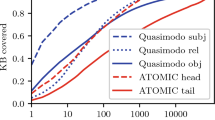Abstract
Commonsense Reasoning is a subfield of artificial intelligence that deals with ability of a computer to imitate mundane decision making. Though the field existed from decades, there has been very little contribution made to the development of commonsense reasoning. Lack of a well-defined methodology as well as computing facilities for implementing commonsense reasoning have always been obstacles in the development process. Semantic networks can be used to conceptualize and implement a part of commonsense reasoning. This paper presents a study on performance measurement and analysis of one such model semantic network used to build commonsense knowledge-base. Various categories of performance measures have been presented to analyze the practicality of such models for automation of commonsense reasoning. Overall, the analysis is intended to present a practical feasibility study of a model semantic network by considering characteristics of a commonsense knowledge-base.
Access this chapter
Tax calculation will be finalised at checkout
Purchases are for personal use only
Similar content being viewed by others
References
Davis, E., Marcus, G.: Commonsense reasoning and commonsense knowledge in artificial intelligence. Commun. ACM 58(9), 92–10 (2015)
De Smedt, T., De Bleser, F., Van Asch, V., Nijs, L., Daelemans, W.: Gravital: natural language processing for computer graphics. In: Creativity and the Agile Mind: A Multi-Disciplinary Study of a Multi-Faceted Phenomenon, pp. 81–98. Mouton, Berlin (2013)
De Smedt, T.: Modeling Creativity: Case Studies in Python, pp. 78–96. University Press Antwerp (2013)
Lim, S., Tucker, C.S., Jablokow, K., Pursel, B.: A semantic network model for measuring engagement and performance in online learning platforms. Comput. Appl. Eng. Educ. 26(5), 1481–1492 (2018)
Davis, E.: Representation of Commonsense Knowledge. Morgan Kaufmann (2014)
Liu, H., Singh, P.: ConceptNet-a practical commonsense reasoning tool-kit. BT Technol. J. 22(4), 211–226 (2004)
Chandan, H., Ashwini, K.: Automation of commonsense reasoning: a study on feasible knowledge representation techniques. Int. J. Adv. Res. Comput. Sci. 8(9), 601–604 (2017)
Akama, H., Mikaye, M., Jung, J., Murphy, B.: Using graph components derived from an associative concept dictionary to predict fMRI neural activation patterns that represent the meaning of nouns. PloS one 10(4) (2015)
Halpern, J.Y.: Reasoning About Uncertainty. MIT Press (2017)
Shachter, R.D., Kanal, L.N., Henrion, M., Lemmer, J.F.: Uncertainty in Artificial Intelligence, vol. 5(10). Elsevier (2017)
Chen, B. Y, Chen, X.W., Chen, H.P., Lam, W.H.: Efficient algorithm for finding k shortest paths based on re-optimization technique. Transp. Res. Part E Logist. Transp. Rev.: 101819 (2019)
Allen, R.J.: The nature of juridical proof: probability as a tool in plausible reasoning. Int. J. Evid. Proof 21(1–2), 133–142 (2017)
Al-Ajlan, A.: The comparison between forward and backward chaining. Int. J. Mach. Learn. Comput. 5(2), 106–113 (2015)
Chen, Y., Elenee-Argentinis, J.D., Weber, G.: IBM Watson: how cognitive computing can be applied to big data challenges in life sciences research. Clin. Therapeut. 38(4), 688–701 (2016)
Author information
Authors and Affiliations
Corresponding author
Editor information
Editors and Affiliations
Rights and permissions
Copyright information
© 2021 The Author(s), under exclusive license to Springer Nature Singapore Pte Ltd.
About this paper
Cite this paper
Hegde, C., Ashwini, K. (2021). Measuring the Performance of a Model Semantic Knowledge-Base for Automation of Commonsense Reasoning. In: Udgata, S.K., Sethi, S., Srirama, S.N. (eds) Intelligent Systems. Lecture Notes in Networks and Systems, vol 185. Springer, Singapore. https://doi.org/10.1007/978-981-33-6081-5_22
Download citation
DOI: https://doi.org/10.1007/978-981-33-6081-5_22
Published:
Publisher Name: Springer, Singapore
Print ISBN: 978-981-33-6080-8
Online ISBN: 978-981-33-6081-5
eBook Packages: Intelligent Technologies and RoboticsIntelligent Technologies and Robotics (R0)




